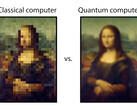As early as in the summer of 2023 the James Webb Space Telescope made observations that pointed to a much older universe than previously assumed after analyzation. More precisely, it was about distant galaxies that should only have been a few hundred million years old, but at that time already appeared to be 10 billion years old.
New calculations, which cast doubt on some popular assumptions about the origin of the universe, confirmed the significantly earlier Big Bang. Neither dark matter nor dark energy would be necessary to explain the model, which is somewhat clumsily called CCC+TL cosmology.
Dark matter and dark energy are absolutely necessary to make the background radiation and the expansion speed of the universe coincide. Otherwise, mass would be missing and the universe would not be the right size.
The author of the studies, Rajendra Gupta (University of Ottawa), relies on other assumptions instead. He does not assume a cosmological constant, the existence of which Einstein also doubted. He calculates with covarying cosmological constants (CCC).
There is also another theory, tired light (TL). It states that light particles lose energy in the course of their existence. At the beginning of the 20th century, this was postulated to explain the measured redshift of galaxies without them moving.
However, if they do move and there is still tired light, which in turn can be explained with various quantum mechanical tricks, the expanding universe and the Big Bang remain, but with a much, much older universe than previously thought.
If these assumptions are put together, the value and distribution of the cosmic background radiation can be calculated just as coherently as by adding dark matter. This can be seen in the second study, which is openly accessiblehttps://iopscience.iop.org/article/10.3847/1538-4357/ad1bc6.
And what would William von Ockham, one of the founders of the philosophy of science, have said about this? If there are several solutions to a problem, the more probable solution is also the correct one. Dark matter versus light fatigue. A draw, right?


 Deutsch
Deutsch English
English Español
Español Français
Français Italiano
Italiano Nederlands
Nederlands Polski
Polski Português
Português Русский
Русский Türkçe
Türkçe Svenska
Svenska Chinese
Chinese Magyar
Magyar










